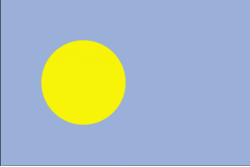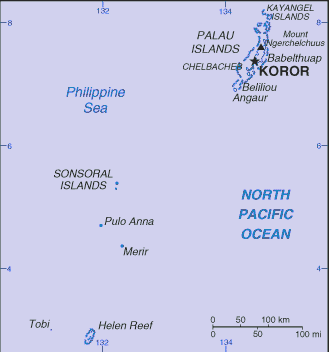Traveling Luck for Palau. Palau, Oceania
Palau is located in Oceania, group of islands in the North Pacific Ocean, southeast of the Philippines.
Land in Palau is varying geologically from the high, mountainous main island of Babelthuap to low, coral islands usually fringed by large barrier reefs.
Palauan land covers an area of 458 square kilometers which is slightly more than 2.5 times the size of Washington, DC
 Palauan national flag (Flag of Palau)
Palauan national flag (Flag of Palau)
As for the Palauan climate; tropical; hot and humid; wet season May to November.
Palauan(s) speak Palauan 64.7% official in all islands except Sonsoral (Sonsoralese and English are official), Tobi (Tobi and English are official), and Angaur (Angaur, Japanese, and English are official), Filipino 13.5%, English 9.4%, Chinese 5.7%, Carolinian 1.5%, Japanese 1.5%, other Asian 2.3%, other languages 1.5% (2000 census).
Places of note in Palau
 Palauan map
Palauan map
Regions of Palau
After three decades as part of the UN Trust Territory of the Pacific under US administration, this westernmost cluster of the Caroline Islands opted for independence in 1978 rather than join the Federated States of Micronesia. A Compact of Free Association with the US was approved in 1986, but not ratified until 1993. It entered into force the following year, when the islands gained independence.
The economy consists primarily of tourism, subsistence agriculture, and fishing. The government is the major employer of the work force, relying heavily on financial assistance from the US. Business and tourist arrivals numbered 63,000 in 2003. The population enjoys a per capita income twice that of the Philippines and much of Micronesia. Long-run prospects for the key tourist sector have been greatly bolstered by the expansion of air travel in the Pacific, the rising prosperity of leading East Asian countries, and the willingness of foreigners to finance infrastructure development.
Palauan natural resources include forests, minerals (especially gold), marine products, deep-seabed minerals
westernmost archipelago in the Caroline chain, consists of six island groups totaling more than 300 islands; includes World War II battleground of Beliliou (Peleliu) and world-famous rock islands
Palauan religion is Roman Catholic 41.6%, Protestant 23.3%, Modekngei 8.8% (indigenous to Palau), Seventh-Day Adventist 5.3%, Jehovah's Witness 0.9%, Latter-Day Saints 0.6%, other religion 3.1%, unspecified or none 16.4% (2000 census).
Natural hazards in Palau include typhoons (June to December).
Travel Advice for Palau
PalauSUMMARY
- There is no British consular representation in Palau. Consular matters are covered by the British Embassy in Manila, the Philippines.
- Only a handful of British tourists visit Palau each year. Most visits to Palau are trouble-free. We are not aware of any British nationals who have required consular assistance in Palau in the past year.
- The threat from terrorism in Palau is low. But you should be aware of the global risk of indiscriminate terrorist attacks, which could be against civilian targets including places frequented by foreigners.
- We strongly recommend that you obtain comprehensive travel and medical insurance before travelling. You should check any exclusions, and that your travel policy covers you for the activities you want to undertake. Please see: Travel Insurance.
SAFETY AND SECURITY
You are advised to wear appropriate safety equipment before engaging in water sports. There are over 60 vertical drop-offs in the diving areas and some are for experienced divers only. Please take local advice on safety at all times when engaging in adventure sports.
LOCAL LAWS AND CUSTOMS
Homosexuality is technically illegal in many Pacific countries and the law is occasionally enforced. Open displays of affection between same-sex partners may offend local inhabitants.
ENTRY REQUIREMENTS
HEALTH
You should seek medical advice before travelling and ensure that all appropriate vaccinations are up to date. For further information on health, check the Department of Health’s websites at: www.dh.gov.uk.
GENERAL

 Search
Search Palau country profile
Palau country profile Travel advice for Palau
Travel advice for Palau